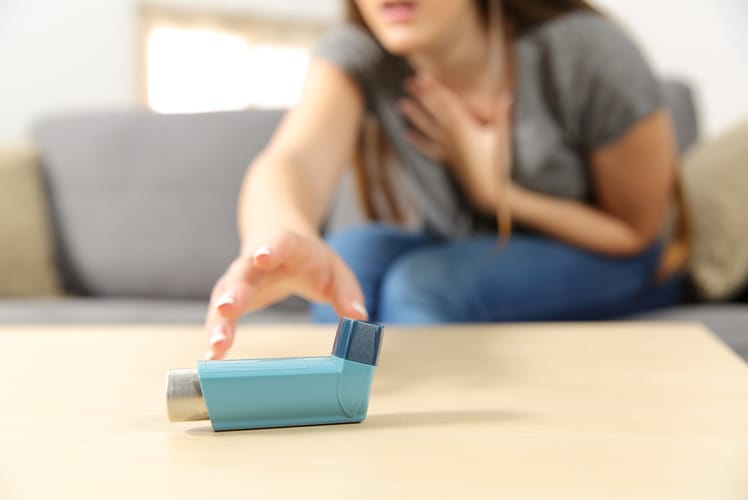Asthma inhalers are medical devices that provide medication to your lungs, either on a regular basis or in an emergency situation. There are many different types of inhalers on the market that can help with many asthma symptoms that individuals might experience. Researching and determining the one that works best for you can help prevent and treat any asthma attacks that arise.
Which inhalers are the best choices for asthma?
A look at the various types of asthma inhalers that are commonly used.
Metered Dose Inhalers
One type of inhaler for asthma is the metered dose version. There are two different types of metered dose inhalers. Each of them features a pressurized canister where the medication is, which fits in a plastic mouthpiece. In most cases, the medication is released by pushing the canister into the mouthpiece and expelling the drug.
In some other metered-dose asthma inhalers, you only inhale and the medication immediately releases on its own. In either type, there is typically a counter so you can see at a glance how many doses you have remaining. If your inhaler does not have this, you will have to keep track of this on your own to avoid running out of medication.
There is another option with a metered inhaler that is most commonly used with children and older adults. A spacer is put in between the inhaler and your mouth after it is released, allowing the entire dose to be inhaled in an easier manner.

Dry Powder Inhalers for Asthma
With a dry powder inhaler, there is no chemical to push the medication out of the inhaler. Instead, the medication is released when you take a quick, deep breath. These inhalers come in a powder disk inhaler, which can be single or multiple doses, or a tube inhaler.
Features of the Main Asthma Inhalers
When it comes to using an inhaler, each type is used a bit differently. If you want the easiest type to use when needed, the metered dose does not require a particular type of breathing to inhale. However, the dry powder options may take a bit longer to get used to.
Also, accidents can happen that cause you to breathe out while using your inhaler. This is not a problem with the metered dose options, but it can blow away the medication in dry powder inhalers.
As far as medication getting on your tongue or in your throat, both metered dose and dry powder can cause this. Using a metered dosage with a spacer, however, acts as a barrier for this type of behavior.
The convenience of carrying is also important for many people. Dry powder and metered dose inhalers are both small and easy to bring with you. A metered dose inhaler that includes a spacer, on the other hand, is going to be less convenient and take more space to carry around.
Some models of metered dose inhalers do not show how many doses are still available, which can be a problem if you do not keep track of it. It is best to choose an inhaler that does offer this information or use a dry powder method, which quickly shows if your medication is running low.
Preparation is also something to consider. With metered doses, you must shake and prime the inhaler before using. However, single-dose dry powder varieties require loading capsules, which can be even more work.
Another factor to consider is the humidity of the area you live in. With a dry powder medication, high humidity can cause clumping in the powder. However, it will not cause any problems with the metered dose asthma medicine.

Other Asthma Inhalers
Those who cannot use a dry powder inhaler or a metered dose inhaler may be switched to a less conventional inhaler. There are two options here: a nebulizer or a metered dose inhaler with a face mask.
The face mask option is typically reserved for babies, toddlers, and small children. It takes a metered dose inhaler with a spacer and then attaches a face mask to it. This mask will be sized to fit over the mouth and nose to ensure the child gets the correct dosage into their lungs.
The nebulizer, on the other hand, works to turn asthma medication into a mist, which is then breathed in via a mask or mouthpiece. These are typically only used for young children, babies, people who are very sick, and people who need larger doses of medication than standard.
Talk to your Doctor
You should speak with your medical provider to decide on the best inhaler for you. The doctor or your pharmacist can also aid you in learning how to use it. This is important because if you do not correctly inhale the medication, it may not help get your asthma under control.

